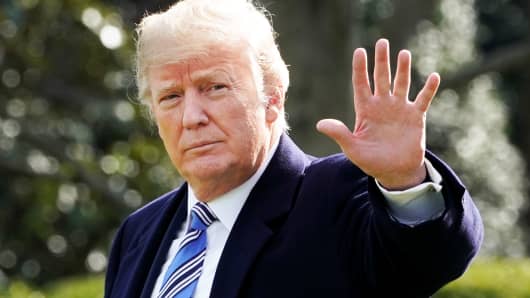President Donald Trump heads to key midterm election state Minnesota on Wednesday trailed by one of the biggest crises of his presidency.
The president holds a rally in Duluth following days of defiance about his administration's policy of separating migrant children from their parents. The president this week has clearly established his crackdown on illegal immigration as a priority ahead of November's critical elections. During a speech Tuesday, a fiery Trump showed no willingness to halt the practice, then urged House Republicans to take action instead.
Bipartisan uproar over the Trump administration's policy of splitting families will follow the president to Minnesota, a state that features several competitive midterm races. A strong performance in the state would boost Republicans or Democrats as they battle for Congress. The winning party will have better control over the direction of Trump's policies such as immigration.
In November, Minnesota will elect a governor and two senators, due to the resignation of Democratic Sen. Al Franken over sexual misconduct accusations. Nonpartisan analysts consider four House seats — two each held by Democrats and Republicans — as toss-ups.
Minnesota as a whole is hardly Trump country, as Democrats have carried it for decades in presidential elections. However, Democrat Hillary Clinton won the state by fewer than 2 percentage points in 2016. That made the state more appealing to Republicans for both 2018 and Trump's re-election bid in 2020.
Trump will speak in the 8th District, a broad area in northeastern Minnesota represented by Democratic Rep. Rick Nolan. The seat is one of the GOP's top House targets. Trump won the district by about 15 percentage points in 2016 and Nolan will not run for re-election.
The family separation issue has reached that race. The leading Republican contender for the seat, former law enforcement official Pete Stauber, has called the policy "absolutely heartbreaking," according to a local news report.
At least five candidates are running for the Democratic nomination for the seat. Mining, which Trump promised to revive in 2016 by lifting regulations on the industry, is a major political issue in the region.
Minnesota's primary elections take place in August.
Elsewhere, Minnesota's 1st District, where Democratic Rep. Tim Walz will not run for re-election, is considered competitive. Trump could have a major influence on that race, as the area in the southern part of the state has a heavy farming presence. China has responded to the president's tariffs on Chinese products with retaliatory measures targeting crops such as soybeans.
The other Minnesota House races considered competitive are the 2nd District, held by GOP Rep. Jason Lewis, and the 3rd District, represented by Republican Rep. Erik Paulsen. Republicans aim to stop Democrats from flipping the 23 GOP-held seats they need in November to take a House majority.
Statewide, Democratic Sens. Amy Klobuchar and Tina Smith face elections this year. The broadly popular Klobuchar is a heavy favorite to win her third term. Multiple Republicans including state Rep. Jim Newberger hope to run against her.
Smith, Minnesota's former lieutenant governor, only started serving in January following her appointment to fill Franken's seat. Though Democrats appear to have an advantage in Minnesota statewide races, Smith has a tougher path to staying in the Senate than Klobuchar does. Several GOP candidates also aim to challenge Smith, and state Sen. Karin Housley has led the fundraising race so far.
Republicans hope to keep or expand their 51 to 49 seat majority in the Senate.
In recent days, Trump has repeatedly contended that he needs more GOP senators in the chamber to pass his immigration agenda. Currently, Republicans need to win over at least nine Democrats to get the 60 votes needed to pass immigration legislation.
